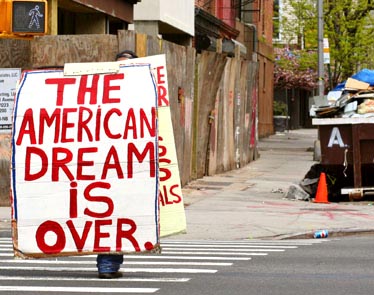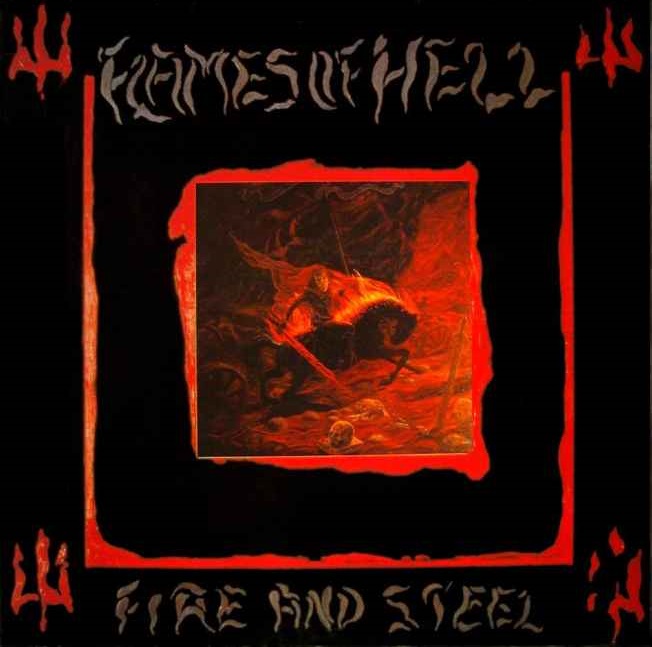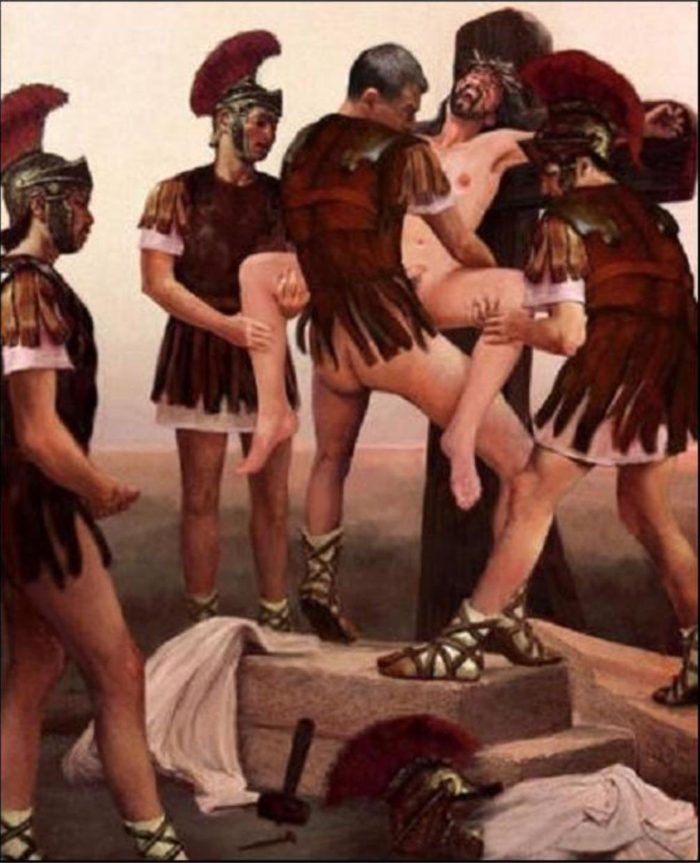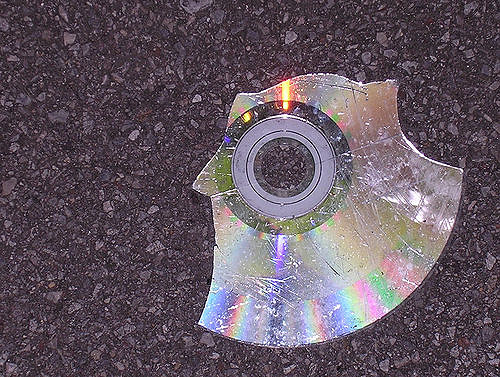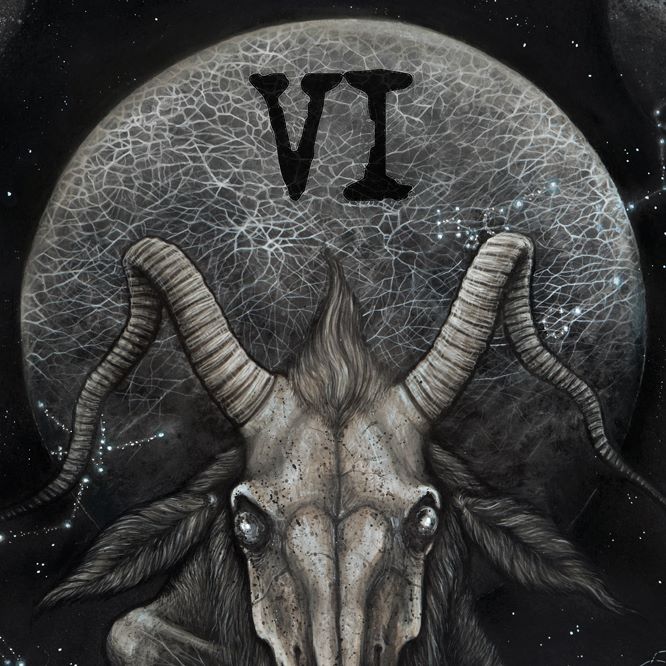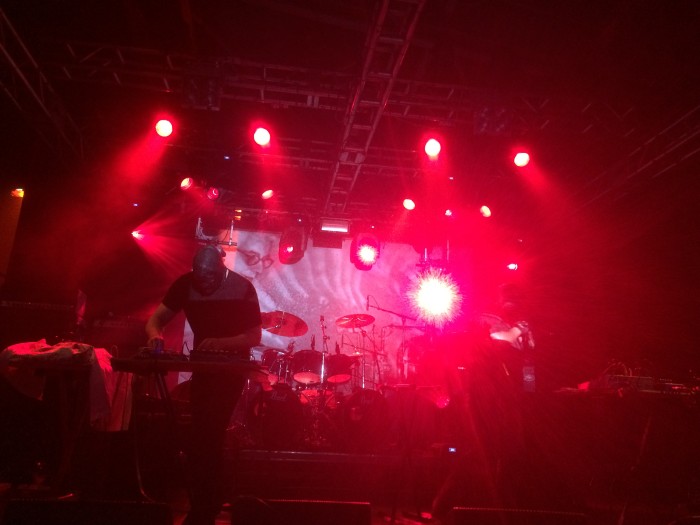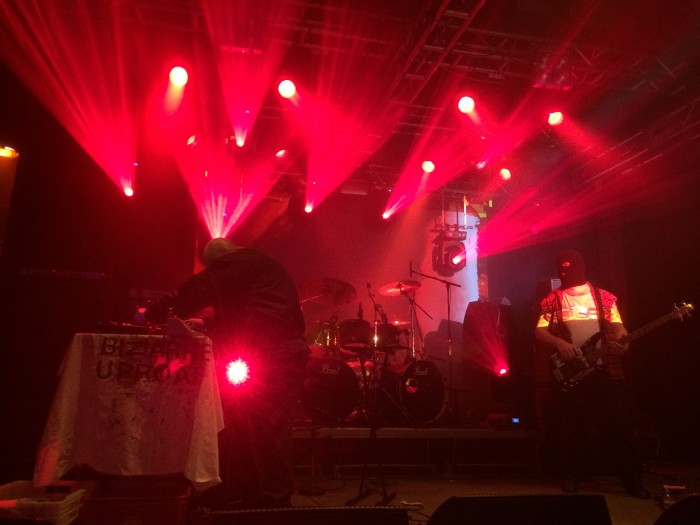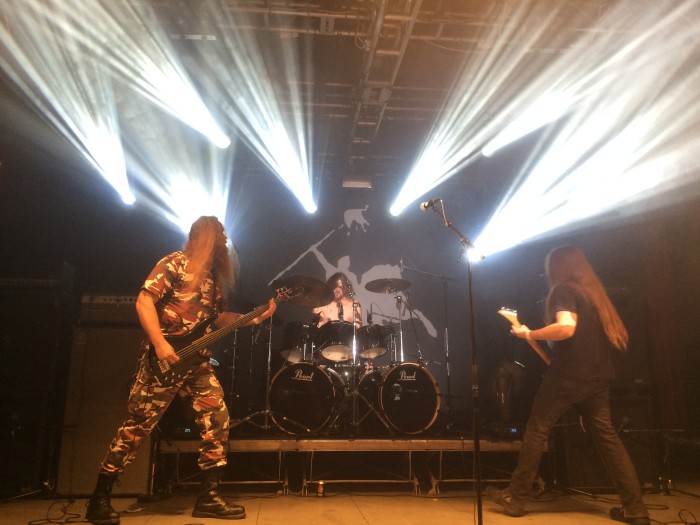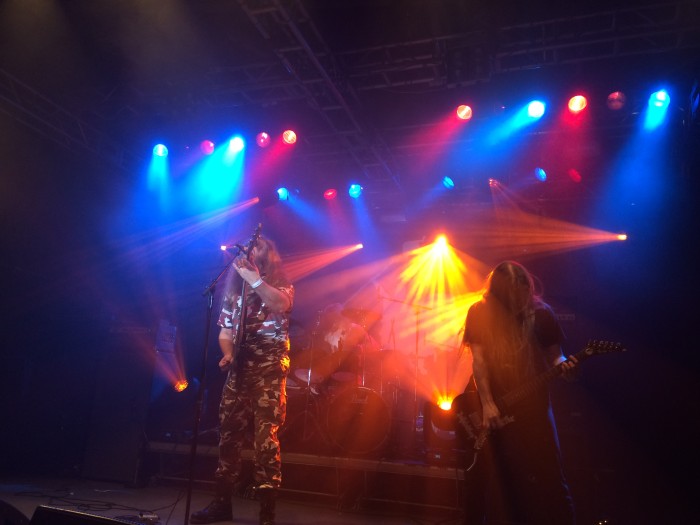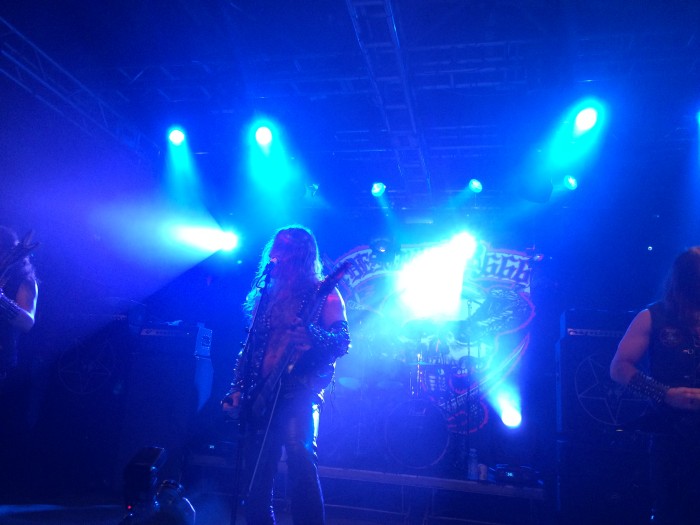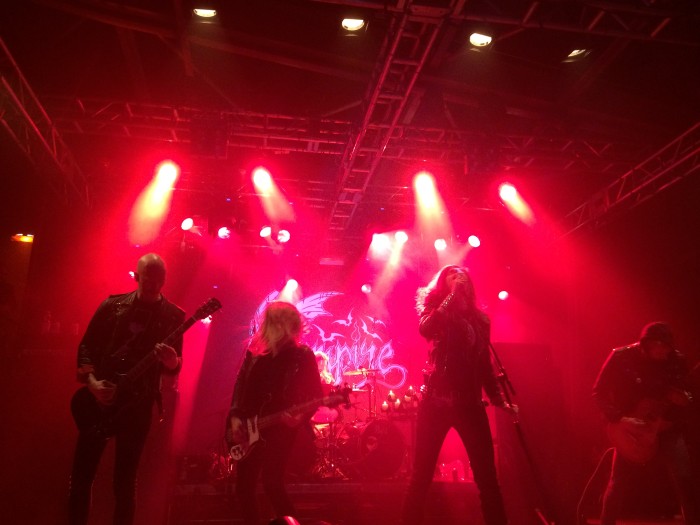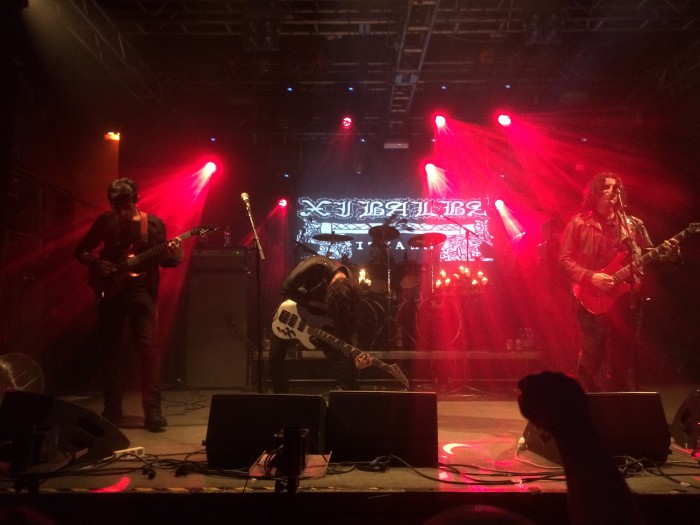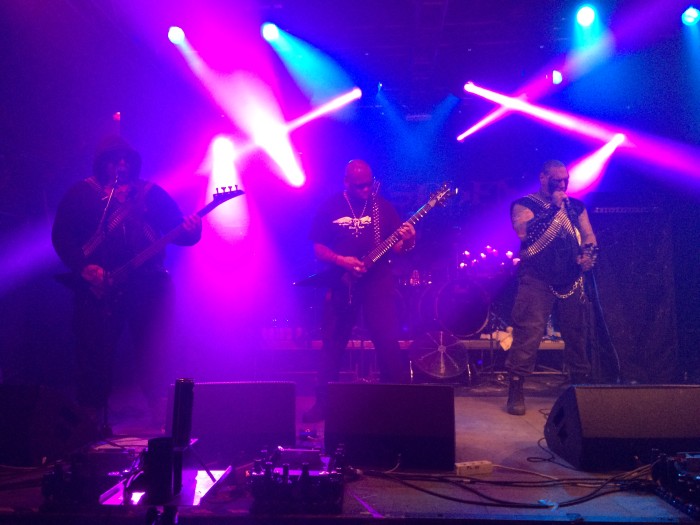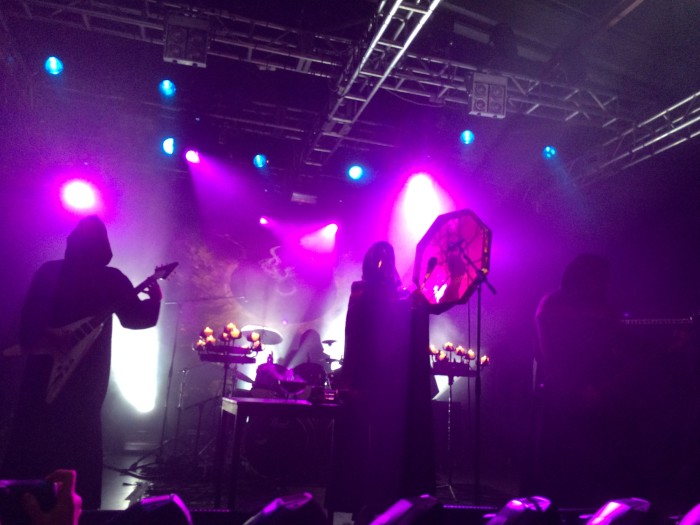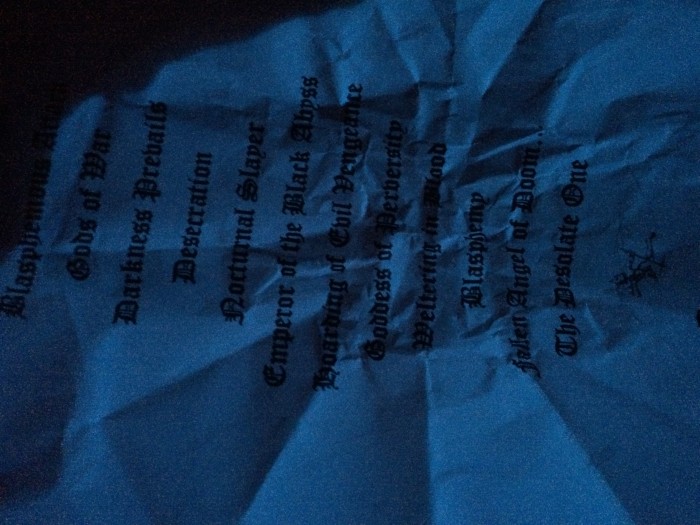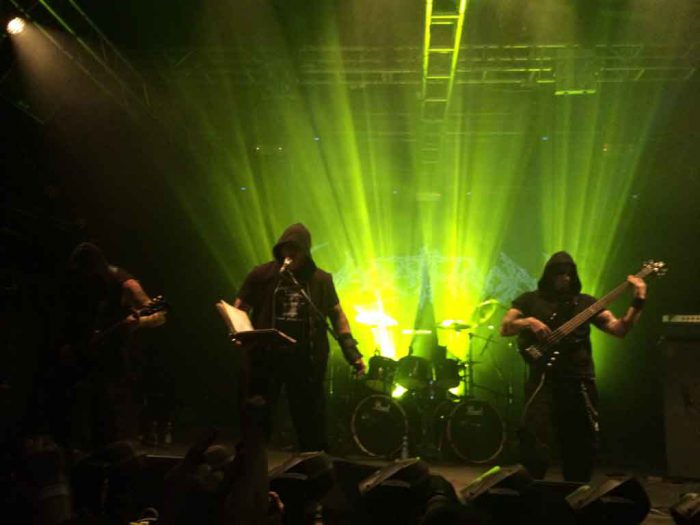
Deeds of Flesh – Of What’s to Come
While I may not like listening to the outcome 100% of the time, especially given the strikingly moronic introduction, I really like what Deeds of Flesh are doing here. Instead of becoming a generic mix like others, they are mixing technical death metal with progressive metal, coming up with something that sounds like Suffocation, Cynic and Necrophagist thrown into a blender. However, the unique Deeds of Flesh flavor asserts itself as the sinew that ties together these influences — the use of fast scales and melodic playing of the same patterns at different intervals to effect implications of key change is pure Necrophagist, and the abrupt transitions between riffs that only make sense when the next transition occurs is straight out of the “Pierced from Within” playbook, the joy at experimentation with odd rhythms leading through convoluted tempo changes and bizarre chording is Cynic-derived, but the playfulness with which Deeds of Flesh are willing to interrupt a pattern and connect a fast technical riff with inverted chording and then drop into a rushing power chord feast which is pure sensory gratification is purely their own. The quick drops to hummingbird fast transitional riffs which made Path of the Weakening such a metal delight are here as well, as are elaborations on ideas from the past two albums. It’s possible we hear later Gorguts or Neuraxis winking from the sidelines as well. People — myself include — will experience aesthetic revulsion at this because in its panopoly of techniques it includes some cheap shots, although not as many as the overplayed and bombastically bloviatory new Cynic, so each time we hear a rhythmic seizure before continuation on the offbeat, we yawn and think that we are hearing the auditory equivalent of trotting out a villain who kills puppies at an opera. Yet in a time of painfully slick and cancerously insincere indie/metal/punk hybrids that have the hipness of a carny, the glibness of a presidential candidate and the soul of a toaster, this honest and well-planned effort from Deeds of Flesh is worth paying attention to — it may be one of the few intelligent directions metal has been taken in the last decade.

Mouth of the Architect – Quietly
More of this combination shoegaze, emo/punk, and doom/drone metal that they try to pass off as post-metal or post-rock, when really if we’re honest we’ll admit it descends from Fugazi, its genre is indie metalcore, and it’s all roughly the same because it aims for the same general goals. Is this really that different than what Jawbreaker was doing fifteen years ago? A lot like Callisto or Godflesh, it is very much rock music tricked out in the techniques of metal, albeit with greater competence than either genre is accustomed to. Songs develop like indie rock: it seems quirky at first until you realize it’s a thesis-antithesis deviation away from a second chorus that’s going to finish out the whole thing. Chord progressions: emo. Vocals: emo metalcore hybrid. Mood: indie. Lasting impact: none; it’s very much like the rest in this genre despite being more musically adept, and brings nothing new in form or content to the table, even if it does “post-metal” better than others.

Verminous – Impious Sacrilege
A fusion of later Merciless and early Seance, this is high-octane blasting drums and quick phrasal riffs alternating with Suffocation style abrupt staccato bursts. The problem is that these songs go nowhere but into their own cycles which, in order to be self-evident, are based on well-known patterns and so extremely repetitive both in listener experience and in motivic redundancy within each song. I would really like to like this. It could be compared to early Grave in its “go for it” attitude, but achieves nothing much memorable because its songs are so linear.

These Arms Are Snakes – The Swallower and Dove
Post-rock with prog-rock jazz-influenced drumming, this CD uses plenty of dissonant and jangly melodies over which pop pours like warm asphalt, but doesn’t fill the cracks in these spacious tunes. Punk riffs plentiful add to the mix, which has a metal-influenced sensibility of The Epic but as filtered through the garage bands of the 1970s who liked blistering the ear and then pouring vinegar syrup into it as a means of hooking the listener. For those who like post-rock and post-metal, this supple fusion purrs.

Volkmar – Blessed Sin
Combining Gothic post-punk/industrial like Sisters of Mercy with a mainstream version of underground metal, Volkmar create simple but ear-catching music that sounds like Gehenna and Wolfsheim colliding in the midst of their associated influences. You can hear Emperor at the edges of their technique, but there’s a lifetime of riffology here with influences as wide as Ministry and Deicide, although all are softened into music designed to flow rather than abruptly disturb. Riffs are basic and tend to hold space rather than redefine it, metal-style, with phrase shape changes but these riffs nonetheless serve the organ-style keyboards and half-chanted, half-sung vocals quite well. It’s not my thing, but it’s what anyone who thinks Marilyn Manson, White Zombie or the new Misfits are cool should be listening to.

Krallice – Krallice
Someone disguised an emo album — listen to the chord shapes and progressions used — as an underground tr00 kvlt black metal album, which is sort of like mixing safe sex and nuclear war. The result is a droning, mincing work that rips a bunch of black metal riffs from the Impaled Nazarene and Niden Div 187 school of budget riffs and puts them into a saccharine melodic morass like Weakling. As a result, individual riffs sound OK, but when you try to listen to the whole thing, you’re left with a sense of it being inappropriate. The crustcore howled-into-the-wind vocals sound out of place as well. But most damningly, there’s zero dynamic change. This will be forgotten in less than a year.

Lions – No Generation
The Beastie Boys “Ill Communication” gets resurrected: rock, industrial and hip-hop beats meld under blues rock riffs played with the rhythm of metal riffs, either the Motorhead “galloping Harley” rhythm or Black Sabbath formal march pace, while a vocalist intones his words with the alternate whine of alternative rock and deft syllabic tuck of underground hip-hop. They know how to write a good harmony and put together remarkably effective songs. Like the Beastie Boys, I can see Lions — with their panopoly of pop culture metaphors mixed into a language of their own — giving the current generation a font of opinion work with which to pepper both their complaints to parents and politically serious college admissions essays.

Withering – Festum Melancholia
This CD sounds like a hybrid between Amorphis “Tales from the Thousand Lakes” and Sentenced “Amok,” complete with the failing of both, which is an inability to let the voice of their music fly free from its heavy metal origins. The big cheesy heavy metal riffs are in here, as are some expertly executed death metal and black metal parts. The problem is that the idea of throwing a bunch of stuff together and somehow making the hybrid distinctive doesn’t work, as metalcore teaches us. Their strength is the bittersweet melodies that tie this whole thing together, which with more focus paid on finding a direction, could really be a great strength. Watch this band in the future, but perhaps bypass this release.

Gortuary – Manic Thoughts of Perverse Mutilation
This band reminds me of Psychomancer, who were sort of around a few years ago, but without the ability to grasp the core of what they’re expressing in a song and bring it to light. All instrumentation is capable, songwriting technique is good, but songs don’t come together and end up being a chaotic riff salad of contradictory impulses. That they do this in old school death metal aesthetic is at first memorable, until you realize that this CD lacks what made the old school great: the ability to bring a dark, brooding, powerful vision of life alive and make it exciting. Spare us.

Green Carnation – Journey to the End of the Night
Add some indie into your doom metal, throw in female vocals that would make Celtic Frost proud, and then update its heavy metal/hard rock riffery with some recent additions from prog-metal, and you have Green Carnation. This CD maintains an interesting mood, but it’s all the texture of the vocals and the pacing, because as art it doesn’t hold up as more than an interesting variation on a known archetype. One of the more adept bands at the songwriting game, Green Carnation are content to use minimal riffing that nonetheless exerts some demands in keeping track of its wandering harmonic focal point and its somewhat abstruse rhythms. It’s like a version of Skepticism that got bred early in the game with later Enslaved or Borknagar, but the real problem is that it is insipid. Melodic progressions trail off in a direction they never resolve; rhythms and song structures build, then fade away; no point is ever made. Neat ideas, good execution, bad (or no) direction.

Dark Angel – We Have Arrived
Unfortunately for this, I heard it after Destruction, which put it well in its place. So you wanna be in what imbeciles called “thrash” but really was speed metal updated after Slayer, where bands like Rigor Mortis, Destruction, Kreator, Pestilence and Devastation go? Really — this is moron music when it’s done wrong, because it likes to have choruses match the dominant rhythm of their most frequent phrase — and here it’s done wrong. Recycled Slayer patterns, a little technical leaps, influences from Sodom and Metallica, but basically it goes nowhere. Very catchy, which becomes annoying when the vapidity sinks in. My advice: people will tell you about this forgotten gem from the past. Bury it. It doesn’t suck but it’s like a bicycle for fishes — unnecessary.

Past Lives – Strange Symmetry
Dramatic, poised like the wit of a writer of letters to an antiquated editor, this music is rock in the style of later Beatles with diverse influences uptucked and emulsified by its strong sense of its own direction. Songs follow a melody that develops, with quirks, into a conventional pop cycle but gives space to the vocalist whose voice bends, creels, dives and twists like metal in fire. Shot through all of this is a facile study of riffs across all genres prevalent in the last twenty years, with the guitarist enjoying to play “in the shadows,” casting some of his more developed offerings into the offbeats, out of focus, as a means of steeping this album in subtlety.

Sakrefix – In Shadow’s Embrace
It’s like In Flames reincarnated. Heavy metal riffs, updated into speed metal, are played in melodic songs that want to be a harder version of Cradle of Filth, maybe throw in some later At the Gates, but at its heart the same plodding stuff that made heavy metal unbearable in the late 1970s is here. Sure, there’s a lot of death metal technique, and these guys are reasonably educated musicians so a few nifty harmonies emerge in transitions, but because they don’t actually write songs these are stranded amidst unassociated, disorganized data that confuses any meaning with chronological prevalence. Check your brain at the door.

Watain – Sworn to the Dark
A friend whose opinion I respect describes these guys as carrying on the spirit of classic Mayhem. Yet what made Mayhem great wasn’t the consistency, but the variations, and Watain is all about setting up a comfortable pattern of melody diverging into rhythm violence, and then pulling out again. None of the mystery of Mayhem is here, but all of the technique; do we want to define great music solely by technique, or what it expresses? Watain are masters of the melodic aggressive black metal sound but go nowhere else. They also like arpeggios and other forms of linear variation that when overused make the music sound like warning tones from factory machinery. Should this be avoided? More than that: a pogrom should be formed against it, as all things which imitate form and not some unifying principle — idea, content, spirit, vision — should be burned to hell because they’re stupid, deconstructive, granular, dysfunctional crap like McCheeseburgers and robot solicitations over the phone. Everything that made the underground weak so it could be replaced with metalcore is present in this album. Too bad, since the first Watain CD is good and even has spirit. Burn this ruin that does not yet appear ruined.

Bloodbath – The Fathomless Misery
If old school death metal (to you) means (objectively, in a subjective sense) that Pantera riffs should bounce right into fast melodic riffs under which an unrelenting snare doubletimes the pace of ranting vocals, and you like that mixed — metalcore style — in a salad of musical “scenes” borrowing different influences and so, when put together, revealing nothing but the underlying indecision common to all melanges, then by all means go buy this fucking thing. But to my mind this is a clothes dryer into which someone has pitched the best moments of the ten top bands in every metal genre, and hit the mix button, coming back later to string it together with rhythm. Like grunge and nu-metal bands, it is obsessed with “difference” through contrast, so in place of dynamics we get the fast melodic riff then the bouncing rhythm riff, or really fast then really slow, or death metal riffs and then some bouncy hard rock/punk combination that sounds like the soundtrack to an aerobics video for Slipknot fans who got too fat to fit into their parole hearings. This CD reminds me of At the Gates “Slaughter of the Soul” and Hail of Bullets “Of Frost in War,” and is equally insincere and directionless.

Katharsis – 666
When things die, those who want the authenticity they conveyed find a way to convincingly imitate them the way computers can imitate speech. You’ll read a paragraph, and it reads “just like” normal writing, until you realize that the sentences don’t relate to each other in meaning, only in appearance of language. While some might argue our record reviews are the same way (and we do generate them with Perl scripts), this CD ends up being a giant disappointment as your heart lifts at the thought of something Darkthroney and good but your deeper brain keeps reminding you that this is random fragments stitched together without any sense of direction. It’s like a yard sale of true black metal bits, and whatever you can afford you put in a box and drop it on top of a constant, fast drumbeat. Then, when you wake up from the nap you did not intend to take, you can ask yourself what it meant. Avoid!

Hollenthon – Opus Magnum
This music is some of the cheesiest and slickest stuff I’ve heard this year. It tries to blend soundtrack melodrama with identifiable metal riffs, and so we end up with Trans-Siberian Orchestra, the “300” edition. Death metal vocals over industrial rhythms with guitars shadowed exactly by keyboards, varying between heavy metal and rock riffs, and the darker underground metal — but by the nature of how it is constructed it cannot leave behind the syncopated expectation nor use a tremolo strum, making a sound that could have just stepped off the pages of a Hollywood blockbuster about superheroes with dark but really flamingly obvious secrets from their childhood. Like so many things that turn out to be shit, this is well executed, but its lack of having of a soul dooms it to being utterly comical and redundant.

The Giraffes – Prime Motivator
Technically, I suppose, this is “surf metal,” but it’s more accurate to describe it as groove-oriented hard rock with an underpinning of punk and Motorhead-style metal rhythm. At that point, resemblance to metal is over: the riffs are Led Zeppelin, the basslines are Sex Pistols, and the vocals are somewhere between Alice in Chains and Barenaked Ladies. This is probably one of the ultimate bar bands for those who want something loud and storming but without the complex emotions or violence of heavy metal. Some compare it to Fu Manchu, and I think that’s roughly close, but really it reminds me more of a lounge act taking on Led Zeppelin or later Danzig and making it super-catchy, yet giving it the dark undertones of alternative rock and nu-metal so it has some meat on the bones. If you are a metal person, avoid this release. If you’re looking for new directions in hard rock, it’s worth exploring.
No Comments